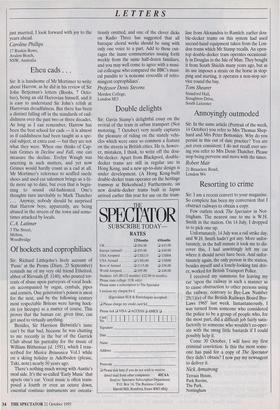Of hockets and coprophiliacs
Sir: Richard Littlejohn's lively account of `Panic' at the Proms (Diary, 23 September) reminds me of my very old friend Ethelred, abbot of Rievaulx 1140), who poured tor- rents of abuse upon purveyors of vocal hock- ets accompanied by organ, cymbals, pipes and comets. One generation's poison is meat for the next, and by the following century most respectable Britons were having hock- ets (or hiccups) as a matter of course. This proves that the human ear, given time, can get used to virtually anything.
Besides, Sir Harrison Birtwistle's taste can't be that bad, because he was chatting to me recently in the bar of the Garrick Club about his partiality for the music of William Blitheman (d. 1591), which I tran- scribed for Musica Britannica Vol.1 while on a skiing holiday in Adelboden (please, Taki, note) nearly 50 years ago.
There's nothing much wrong with Auntie's mod side. It's the so-called 'Early Music' that upsets one's ear. Vocal music is often trans- posed a fourth or even an octave down, essential continuo instruments are ostenta- tiously omitted, and one of the clever dicks on Radio Three has suggested that all baroque choral works should be sung with only one voice to a part. Add to these out- rages the inane commentaries issuing forth weekly from the same half-dozen familiars, and you may well come to agree with a musi- cal colleague who compared the BBC's musi- cal pundits to 'a noisome crocodile of retro- mingent coprophiliacs'.
Professor Denis Stevens
Morden College, London SE3










































































 Previous page
Previous page